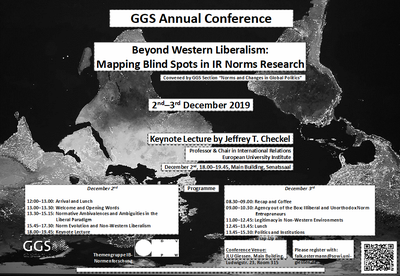GGS Annual Conference 2019 "Beyond Western Liberalism: Mapping Blind Spots in IR Norm Research"
Beyond Western Liberalism:
Mapping Blind Spots in IR Norms Research
Annual Conference of the GGS –
Giessen Graduate Centre for Social Sciences, Business, Economics and Law
(University of Giessen)
Convened by
GGS section “Norms and Changes in Global Politics”
in cooperation with
DVPW thematic group “IR Norms Research”
Institute for Peace Research and Security Policy at the University of Hamburg (ISFH)
Institute of Political Science (University of Duisburg-Essen)
Peace Research Institute Frankfurt (PRIF)
Keynote Speaker:
Jeffrey T. Checkel
Professor & Chair in International Politics
European University Institute
Date: 2nd – 3rd December 2019
Venue: Justus-Liebig-University Giessen, Main building, Ludwigstr. 23, room 315, Giessen
Keynote lecture: Main building, Ludwigstr. 23, Senatssaal.
IR norms research has developed a significant body of knowledge on the question of how norms affect international relations. It has established approaches in IR that do not only take material or rational interests into account, but also the implications, meanings and effects of ideas, norms and identities. It shows how norms matter in international relations, how they come into existence and change over time. Even though IR norm research has established a geographical focus both in the global North and the global South, the substantial focus of the norms being discussed often lies on liberal or so-called Western norms, or on norm entrepreneurs who promote Western or liberal standards of appropriateness in an international context. Accordingly, a critical strand of norms research has developed over the past years, criticizing an overly ‘Euro-centric’ or ‘Western-centric’ perspective, and encompassing a broader understanding of norms as processes rather than fixed entities. It contributes to the further development of IR norms research, which is not only limited to norms as the object of research, but also takes the position of the researcher and the larger context of norms into account. This approach requires going beyond a simple ‘good v. bad’ distinction of norms, and to develop a more in-depth understanding of the standards and models that serve as yardsticks for the evaluation of norms and normative orders.
Registration: The conference welcomes interested participants (limited places available). Please register no later than November 22nd with Falk.Ostermann@sowi.uni-giessen.de.
The complete programme is available here.

